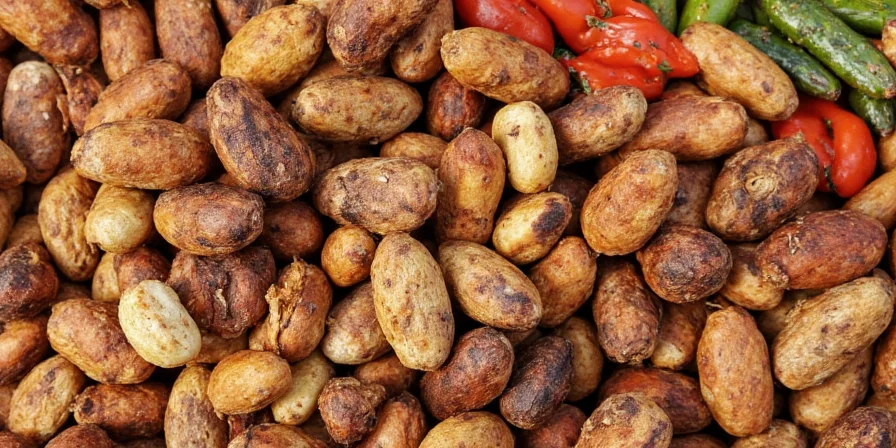A Culinary Adventure: The Rich Tapestry of African Food
Africa, a continent rich in culture, history, and diversity, is home to an array of culinary traditions that reflect its multifaceted societies.
The Diversity of African Cuisine
From the spicy stews of North Africa to the grilled meats of the South, African food is as varied as its geography. Each region boasts unique flavors and ingredients that tell the story of its people.
- North Africa: Known for its aromatic spices and slow-cooked tagines.
- West Africa: Famous for its hearty dishes like jollof rice and egusi soup.
- East Africa: Renowned for its use of grains and fresh vegetables, with dishes like ugali.
- Central Africa: Features cassava, plantains, and rich stews.
- Southern Africa: Celebrated for its barbecue, or braai, and biltong.
Key Ingredients in African Cooking
The heart of African cuisine lies in its ingredients. Here’s a closer look at some staple foods:
| Ingredient | Region | Common Uses |
|---|---|---|
| Maize | Southern Africa | Used to make porridge, tortillas, and more. |
| Cassava | Central and West Africa | Used in fufu and as a flour substitute. |
| Rice | West Africa | Essential for jollof rice and fried rice dishes. |
| Spices | North Africa | Cumin, coriander, and saffron are common. |
Traditional Cooking Techniques
African cooking is characterized by traditional methods that have been passed down through generations. Here are a few:
1. Grilling
Grilling is a popular method especially in Southern Africa, where meats are seasoned and cooked over open flames. Dishes like boerewors (sausage) are staples during social gatherings.
2. Stewing
Stews are a comforting staple across the continent. Ingredients are simmered together to create rich, flavorful dishes. For instance, the Moroccan tagine is a slow-cooked stew named after the earthenware pot it's cooked in.
3. Fermentation
In many African cultures, fermentation is used to preserve foods and enhance flavors. Foods like injera, a sourdough flatbread from Ethiopia, showcase this technique.
Signature Dishes from Across Africa
Every region in Africa boasts signature dishes that highlight local ingredients and cooking traditions. Here are a few notable mentions:
- Jollof Rice: A beloved West African dish made with rice, tomatoes, onions, and a blend of spices.
- Bunny Chow: A South African street food consisting of a hollowed-out loaf of bread filled with curry.
- Couscous: A staple in North Africa, couscous is made from steamed semolina and often served with meat and vegetables.
- Injera: A sourdough flatbread from Ethiopia, typically served with a variety of stews.
- Tagine: A North African stew named after the pot it’s cooked in, known for its rich flavors and tender meats.
The Role of Spices in African Food
Spices play a crucial role in African cuisine, enhancing flavors and adding depth to dishes. Here are some key spices:
- Cumin: Common in North African dishes, adding earthiness.
- Coriander: Used in both seed and leaf forms, it adds freshness to many dishes.
- Ginger: Widely used across the continent for its strong flavor and health benefits.
- Chili Peppers: Adding heat and spice, particularly in East and Southern Africa.
A Cultural Perspective on Food
Food in Africa is not just sustenance; it’s a vital part of cultural identity and community. Meals often bring families and communities together, creating bonds and celebrating heritage.
Festivals and Food
Many African festivals revolve around food, showcasing traditional dishes and communal cooking. For example, the annual Jollof Festival in Nigeria celebrates the famous dish with cooking competitions and cultural performances.
Food as a Symbol
Different foods have different meanings across cultures. For instance, the sharing of bread can symbolize unity, while certain dishes may be reserved for special occasions or ceremonies.
Modern Influences on African Cuisine
As globalization continues to shape the culinary landscape, African cuisine is also evolving. Chefs are experimenting with traditional dishes, incorporating international flavors and techniques.
Fusion Cuisine
Fusion cuisine is becoming increasingly popular, blending African ingredients with global cooking styles. Dishes like Moroccan-spiced tacos or African-inspired sushi highlight this trend.
The Rise of African Chefs
With a growing interest in African cuisine worldwide, many chefs are gaining recognition for their innovative takes on traditional dishes. They are bringing the flavors of Africa to international stages, showcasing the continent's culinary diversity.
Conclusion: A Taste of Africa
Exploring African food is a journey through a rich cultural landscape filled with diverse flavors and traditions. From the spices of North Africa to the hearty stews of the South, every dish tells a story. As the world continues to embrace African cuisine, it’s essential to appreciate its roots and the vibrant cultures that contribute to its richness.











 浙公网安备
33010002000092号
浙公网安备
33010002000092号 浙B2-20120091-4
浙B2-20120091-4